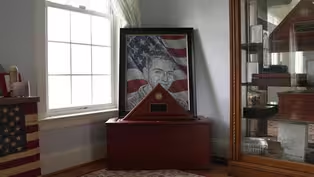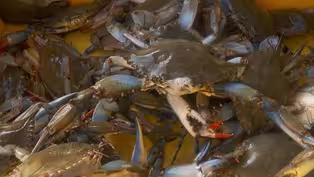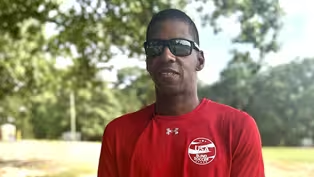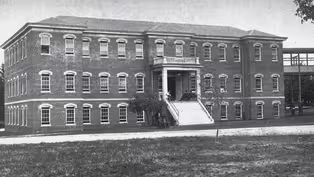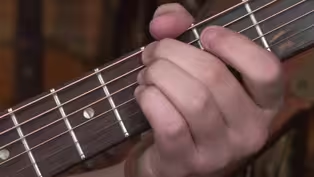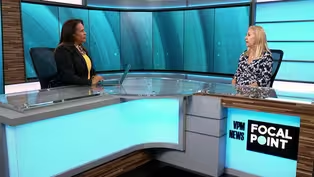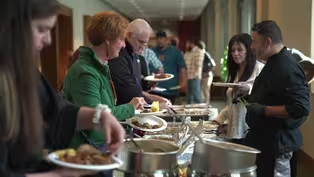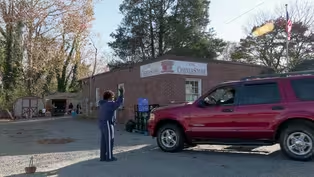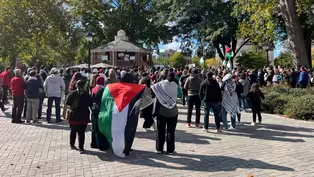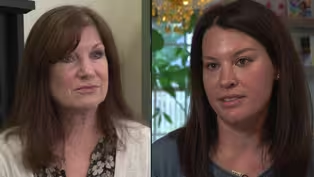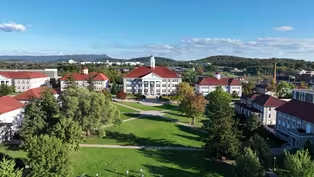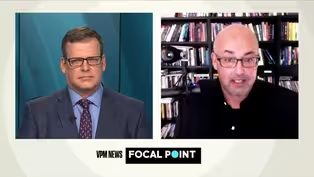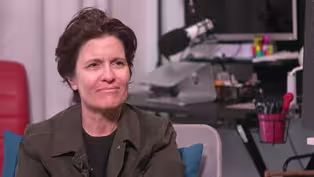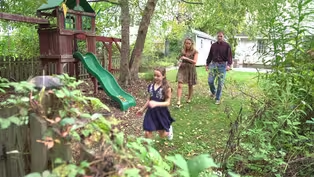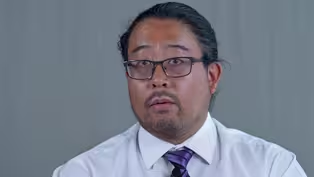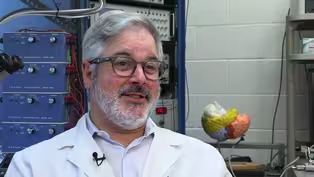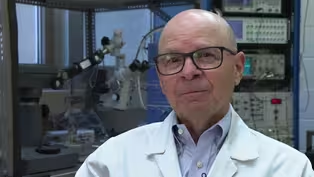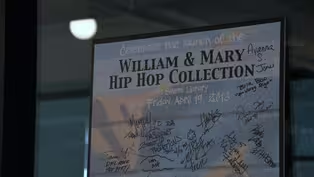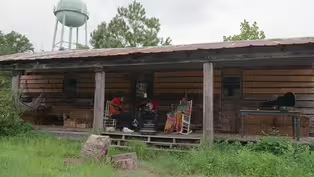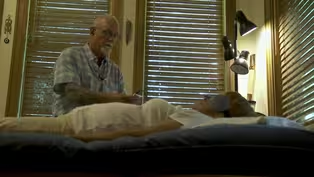VPM News Focal Point
Young man’s death invokes the history of Central State
Clip: Season 2 | 6m 36sVideo has Closed Captions
Professor says racial bias denies Black Americans their humanity during a mental crisis.
Shawn Utsey is a documentarian and psychology professor. He says Virginia’s Central State Hospital, which was the first psychiatric hospital for Black people in the United States, began with an emphasis on controlling newly-freed slaves. He says the criminalization of Black people then is the very mindset that led to the death of Irvo Otieno.
Problems playing video? | Closed Captioning Feedback
Problems playing video? | Closed Captioning Feedback
VPM News Focal Point is a local public television program presented by VPM
The Estate of Mrs. Ann Lee Saunders Brown
VPM News Focal Point
Young man’s death invokes the history of Central State
Clip: Season 2 | 6m 36sVideo has Closed Captions
Shawn Utsey is a documentarian and psychology professor. He says Virginia’s Central State Hospital, which was the first psychiatric hospital for Black people in the United States, began with an emphasis on controlling newly-freed slaves. He says the criminalization of Black people then is the very mindset that led to the death of Irvo Otieno.
Problems playing video? | Closed Captioning Feedback
How to Watch VPM News Focal Point
VPM News Focal Point is available to stream on pbs.org and the free PBS App, available on iPhone, Apple TV, Android TV, Android smartphones, Amazon Fire TV, Amazon Fire Tablet, Roku, Samsung Smart TV, and Vizio.
Providing Support for PBS.org
Learn Moreabout PBS online sponsorshipANGIE MILES: This is the video that has stunned and saddened the world.
28-year-old Irvo Otieno was pinned to the floor and suffocated during intake at Petersburg's Central State Hospital.
Seven sheriffs deputies and three hospital workers are now charged with the Henrico man's death.
GILDA PEGRAM: We were looking through the little door, they'll see someone they be hollering, carrying on.
I was afraid, I'll be truthful with you.
ANGIE MILES: As the producer of this recent documentary on the history of Central State Hospital, Shawn Utsey says he is deeply troubled by what happened for many reasons.
SHAWN UTSEY: The historical interpretation of Black behavior as being essentially criminal permeates all spheres of life.
So, even though the police took him here because he was having a mental health crisis and understood that what he's doing is because he's having a crisis.
But apparently something he did flipped the switch and now he was criminal.
ANGIE MILES: Utsey is a professor of psychology at Virginia Commonwealth University.
His areas of interest include race related trauma and stress.
He's also president of the Virginia Association of Black Psychologists.
SHAWN UTSEY: And so, now they've decided that we're no longer going to deal with this gentleman as having a mental health crisis and we're going to now deal with him as a criminal.
We take him to jail.
And so, even when they left jail and took him to Central State Hospital, there were more police on the scene than there were Central State Hospital staff because it was still a criminal matter in the psyches of those attending to him.
ANGIE MILES: Utsey says he's troubled by parallels with the early history of Central State Hospital.
Following the Civil War, the facility was Virginia's lunatic asylum for the colored insane and it became the country's first public institution for Black people in need of mental health services.
SHAWN UTSEY: The argument toward the end of slavery was that if you let these folks go, if you free them, you're going to see an increase in insanity.
These were literally theories of psychiatrists at the time that slavery was a protective factor and allowed Black people to not know insanity.
And freedom was going to result in an increase in insanity across the country.
And we saw this born out in the rates of admission, not only at Central State Hospital, but others around the country post-slavery.
And they began to find utility in using it as a source of social control.
“What do you do with a Black person who doesn't know his place?
” ANGIE MILES: According to Utsey, the original Central State Hospital was really a new style of plantation where Black people were often mislabeled, falsely accused, corralled and abused.
SHAWN UTSEY: Central State Hospital had a farm and the patients labored upon that farm.
And the farm really created or turned a profit that was surprising even to the administrators.
And so there was no real treatment at the beginning.
And through the 1950s, there were no treatment.
It was really custodial care.
And sometimes that was abusive.
They would also lease the patients out to the other insane asylum in Williamsburg, Eastern State.
And the patients at Central State would then go to Eastern State and wait on the white patients at - in the hospital.
ANGIE MILES: From 1870 through the mid 1900s, Central State grew to a multi-building campus that housed close to 5,000 people.
PEIGHTON YOUNG: It was kind of a catchall.
It was if you were adolescent delinquents, you went there.
If you were Black and ill, you went there.
If you were poor, you went there.
If you were rich, you went there.
If you needed any kind of health services, mental services or a dormitory or a place to stay or a place for law enforcement to commit you that wasn't in a prison, that was where you went.
ANGIE MILES: Peighton Young is a public historian and one of many Virginians who recall a negative family history related to Central State Hospital.
Young's third great-grandmother was Maggie Barbara Jefferson.
PEIGHTON YOUNG: She was seeing a man and she had a mental breakdown over him and we don't know if she was committed voluntarily or if she was committed against her will, but she essentially ended up at the Central State asylum for colored people in Petersburg, Virginia.
And that was what it was called at the time.
It's now Central State Hospital.
She disappears from the records after 1950.
ANGIE MILES: In short, Utsey says the hospital's distant history includes Black people being institutionalized without legitimate reasons and sometimes exploited for labor or experimentation.
He says, central State Hospital integrated since 1967 is no longer that place, but became a true asset for mental health services powered by the humanity of the people who worked there.
He adds that poorly trained or transient staff can certainly cause harm.
Utsey says this death of Irvo Otieno harkens back to the dismal past of Central State.
The bigger problem for society, he says, is criminalizing mental health needs especially of Black people, especially of Black men.
SHAWN UTSEY: Being uncomfortable in the presence of police is a very logical response for Black people.
I'm uncomfortable in the presence of police.
If the police pulled me over, I would be nervous, right?
If I had to go to the hospital, I would rather go in the ambulance than the police car.
ANGIE MILES: He says, the opportunity in the tragic demise of Irvo Otieno is to recognize a racially biased tendency to associate Black mental health with criminality.
He says, it's time for change.
SHAWN UTSEY: What I would've liked to have seen would be psychiatrists and psychologists at the forefront trying to deescalate what was going on to ask the police to stand back to have staff execute a proper restraint of patients as they're trained to do and then engage in the ways that training has provided for them to deescalate these situations all the time.
Video has Closed Captions
Clip: S2 | 8m 27s | One way of honoring those who make the ultimate sacrifice is to care for their children. (8m 27s)
Reviving a forgotten beach called Bay Shore
Video has Closed Captions
Clip: S2 | 7m 49s | It was a welcoming playground for Black beachgoers during segregation. (7m 49s)
Video has Closed Captions
Clip: S2 | 2m 34s | Crabbers and regulators clash as Blue Crab populations remain below historic averages. (2m 34s)
Art teachers mentor high school students at Art 180
Video has Closed Captions
Clip: S2 | 5m 41s | Art 180’s Artists residency program connects high school students with working artists. (5m 41s)
Antoine Craig: a blind soccer star who guides others
Video has Closed Captions
Clip: S2 | 5m 10s | Antoine Craig is a member of the first-ever U.S. Men’s National Blind Soccer team (5m 10s)
Politics of abortion in Virginia
Video has Closed Captions
Clip: S2 | 5m 30s | Abortion is on the ballot in Virginia’s November election. (5m 30s)
Young man’s death invokes the history of Central State
Video has Closed Captions
Clip: S2 | 6m 36s | Professor says racial bias denies Black Americans their humanity during a mental crisis. (6m 36s)
UVA’s Larry Sabato talks about historic Trump indictment
Video has Closed Captions
Clip: S2 | 7m 55s | Political analyst Larry Sabato talks about the indictment of former President Donald Trump (7m 55s)
Two-Branch Veteran Focuses on the Future
Clip: S2 Ep19 | 8m 12s | Better preparation for transitions is Jackson's focus (8m 12s)
Samuel Harris wants to invest in vets
Clip: S2 Ep19 | 10m 16s | He's building awareness and support for incarcerated veterans (10m 16s)
Incarcerated veteran takes on leadership role
Clip: S2 Ep19 | 12m 21s | As president of Operation Phoenix, Hall seeks change (12m 21s)
Incarcerated veteran still aims to serve
Clip: S2 Ep19 | 12m 23s | White aims to educate and be educated after twenty years (12m 23s)
He says we've seen this before
Clip: S2 Ep19 | 8m 40s | Navy veteran Tim Miller says veterans face old demons (8m 40s)
Former Marine says it's about the training
Clip: S2 Ep19 | 4m 48s | Wallace says there's good and bad in the military lifestyle (4m 48s)
Aber says Project Exile is in exile
Clip: S2 Ep13 | 17m 2s | Crime-fighting office says it's not in their vocabulary (17m 2s)
A Young Guitar Player on Galax
Video has Closed Captions
Clip: S2 Ep16 | 1m | Lucas Nichols, a guitar player from West Virginia, plays his cover of Blackberry Blossom. (1m)
What are our children eating at school?
Video has Closed Captions
Clip: S2 Ep20 | 8m 15s | Providing fresh options for Virginia’s students that’s helping local farmers and our kids. (8m 15s)
Iconic Chesapeake Bay blue crabs on the rise
Video has Closed Captions
Clip: S2 Ep20 | 2m 12s | There’s an estimated 323 million crabs living in the Chesapeake Bay. (2m 12s)
A Food Revolution led by Native Americans
Video has Closed Captions
Clip: S2 Ep20 | 7m 47s | Native Americans have begun a movement around healthier food and sustainable agriculture. (7m 47s)
Fit4Kids turns exercise and healthy food into a game
Video has Closed Captions
Clip: S2 Ep20 | 3m 26s | Fit4Kids promotes a healthy lifestyle for children by making nutrition and movement fun. (3m 26s)
Families facing food insecurity turn to CornerStore
Video has Closed Captions
Clip: S2 Ep20 | 3m 33s | People living in Virginia rural communities find themselves in a food desert. (3m 33s)
A Virginia veteran challenges limitations to the GI Bill
Video has Closed Captions
Clip: S2 Ep19 | 1m 53s | A veteran accepted at Yale is arguing for benefits given under the GI Bill (1m 53s)
Video has Closed Captions
Clip: S2 Ep19 | 8m 14s | The prison population includes a disproportionate percentage of veterans (8m 14s)
Video has Closed Captions
Clip: S2 Ep19 | 6m 11s | Community efforts focus on suicide prevention (6m 11s)
How Virginia supports its most vulnerable veterans
Video has Closed Captions
Clip: S2 Ep19 | 8m 42s | Helping Virginia’s veterans entangled in the criminal justice system. (8m 42s)
Helping Latino Veterans Thrive
Video has Closed Captions
Clip: S2 Ep19 | 3m 6s | Virginia is home to the only national non-profit focused on helping all Latino veterans (3m 6s)
The Right to Bear Arms vs. The Right to Public Safety
Video has Closed Captions
Clip: S2 Ep18 | 5m 47s | When rights collide over gun ownership versus gun control, a look at the gun debate. (5m 47s)
Israel-Hamas War: Origins and Potential for Escalation
Video has Closed Captions
Clip: S2 Ep18 | 7m 15s | The origins of the war between Israel and Hamas and the potential for a growing conflict. (7m 15s)
Impact of Israel-Hamas War on Virginians
Video has Closed Captions
Clip: S2 Ep18 | 2m 19s | Virginians are reacting to the Israel-Hamas War by exercising their right to protest. (2m 19s)
Video has Closed Captions
Clip: S2 Ep18 | 4m 26s | Two women, guided by their faith, end up on different sides of the debate over abortion. (4m 26s)
Campus Free Speech in Virginia
Video has Closed Captions
Clip: S2 Ep18 | 3m 27s | Where does a student’s right to protest on campus and a speaker’s right to speak collide? (3m 27s)
Virginia Is The World’s Data Center Hub - What’s The Cost?
Video has Closed Captions
Clip: S2 Ep17 | 4m 37s | Most of the world’s internet data flows through Virginia. What do more data centers mean? (4m 37s)
Technology Expert on the Biggest Threats to Democracy
Video has Closed Captions
Clip: S2 Ep17 | 13m 36s | Expert says AI, fake news and social media are not the biggest threats facing democracy. (13m 36s)
Tech journalist and podcast host Kara Swisher talks about AI
Video has Closed Captions
Clip: S2 Ep17 | 19m 7s | Tech journalist and podcast host Kara Swisher says AI "can be a weapon but it’s a tool." (19m 7s)
Is technology overuse hijacking our children’s brains?
Video has Closed Captions
Clip: S2 Ep17 | 3m 18s | A Chantilly, VA teacher says technology overuse is making kids less intelligent. (3m 18s)
Epilepsy treatments: Dr. Kenichiro Ono, VCU Health
Video has Closed Captions
Clip: S2 Ep17 | 3m 17s | Neurologist Dr. Kenichiro Ono discusses deep brain stimulation and treating epilepsy. (3m 17s)
Deep brain stimulation and disease: Dr. Paul Koch, VCU
Video has Closed Captions
Clip: S2 Ep17 | 10m 58s | Dr. Paul Koch discusses deep brain stimulation research and the treatment of disease. (10m 58s)
Video has Closed Captions
Clip: S2 Ep17 | 2m 12s | Artificial intelligence is proving useful for medical breakthroughs (2m 12s)
Artificial intelligence: What are the risks and benefits?
Video has Closed Captions
Clip: S2 Ep17 | 7m 46s | What does a future with artificial intelligence look like? We examine risks and benefits. (7m 46s)
AI, implants & smell: Dr. Daniel Coelho, VCU Health
Video has Closed Captions
Clip: S2 Ep17 | 9m 2s | Dr. Daniel Coelho discusses deep brain stimulation research (9m 2s)
AI and olfactory-implant systems: Dr. Richard Costanzo, VCU
Video has Closed Captions
Clip: S2 Ep17 | 7m 33s | Dr. Richard Costanzo discusses deep brain stimulation research about the sense of smell. (7m 33s)
Traditions Converge at the 87th Old Fiddler’s Convention
Video has Closed Captions
Clip: S2 Ep16 | 3m 43s | Old Time and Bluegrass music on display in Galax, Va., with bands coming from far away. (3m 43s)
Preserving Virginia’s Hip Hop Culture
Video has Closed Captions
Clip: S2 Ep16 | 1m 55s | A university in Virginia is working to preserve hip-hop culture and history. (1m 55s)
Video has Closed Captions
Clip: S2 Ep16 | 8m 39s | The Virginia Humanities Folklife Apprenticeship helps musicians connect to their roots. (8m 39s)
Video has Closed Captions
Clip: S2 Ep16 | 7m 27s | How music education is changing young lives. (7m 27s)
Video has Closed Captions
Clip: S2 Ep16 | 4m 14s | Discover how music has the power to heal those in addiction recovery. (4m 14s)
Video has Closed Captions
Clip: S2 Ep15 | 4m 7s | How redlining is still impacting Black homebuyers. (4m 7s)
A school integration pioneer recalls the end of segregation
Video has Closed Captions
Clip: S2 Ep15 | 13m 21s | The Charlottesville Twelve integrated schools more than a year before Ruby Bridges. (13m 21s)
In Richmond, life expectancy can vary by up to 20 years
Video has Closed Captions
Clip: S2 Ep15 | 3m 10s | Life expectancy varies widely across Richmond’s neighborhoods, according to a VCU study. (3m 10s)
Henrico woman looks to end stereotypes in the water
Video has Closed Captions
Clip: S2 Ep15 | 3m 1s | A Black woman who learned to swim as an adult now seeks to teach others the same skills. (3m 1s)
Providing Support for PBS.org
Learn Moreabout PBS online sponsorship
- News and Public Affairs

Top journalists deliver compelling original analysis of the hour's headlines.

- News and Public Affairs

FRONTLINE is investigative journalism that questions, explains and changes our world.












Support for PBS provided by:
VPM News Focal Point is a local public television program presented by VPM
The Estate of Mrs. Ann Lee Saunders Brown
